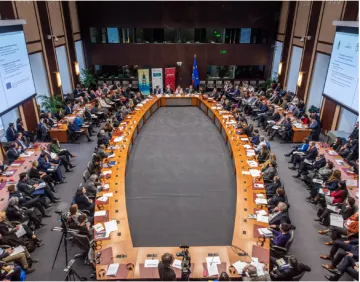The Middle East and North Africa region is a laboratory to test the limits of the global order

MENARA Project, led by the Barcelona Centre for International Affairs (CIDOB) and Istituto Affari Internazionali (IAI), confirms that the US retreat from the region and Russia’s willingness to fill the power vacuum in Syria, in addition to China flexing its economic muscles across the region, have created a new reality.
On March 6th, after three years of work, MENARA Project unveiled its findings during the public conference The Middle East and the EU: New Realities, New Policies held at Egmont Palace in Brussels.
During the event, that gathered more than 200 experts and policy-makers, the High Representative of the EU for Foreign Affairs and Security Policy and Vice President of the EU Commission Federica Mogherini, highlighted the importance of “resetting our thinking, allowing us to see what could be built”. The Middle East and North Africa region is now at a crossroads: “After ten years of conflict and turmoil, there is a glimpse of hope that we cannot ignore” stated Mogherini. “Although peace in the Middle East and North Africa cannot be imposed from the outside, we have a duty to continue producing new ideas and proposals to contribute to this goal and prevent the darkest scenarios to come into reality”, added the High Representative of the EU for Foreign Affairs and Security Policy.
In this context, MENARA’s scientific coordinator Eduard Soler, senior research fellow at CIDOB, and MENARA’s policy coordinator Nathalie Tocci, director of IAI, presented the main results of their research:
- MENARA foresees that those territories suffering from a combination of environmental degradation, persistent inequalities and delegitimised institutions could witness new waves of social unrest which could be harshly repressed and put the international community in a very uncomfortable position.
- While risks are often associated to political and security dynamics, societal and economic elements are seen as more promising. Youth and dialogue are often mentioned as the key of success. MENARA has highlighted potential positive developments: digitalisation, the pivot to Africa, the plans to foster renewable energies, economic diversification plans, post-sectarian political and social dynamics in Iraq or sustained progress in women empowerment.
- It also identifies huge differences when it comes to levels of hope. The levels of pessimism are particularly high in Egypt and among politicians and officials. Instead, the project notices more optimism in Iran and the Maghreb and among women and the private sector.
- When projecting current trends into the future, Russia is considered to remain a key player all along the next decade but long-term prospects point at a growing role of China in global affairs and also in this particular region.
- When it comes to the EU engagement in the MENA region, proximity is the key word. MENARA suggests that the EU will have to widen the scope to accommodate to the region’s shifting centres of gravity (Africa and the Gulf), the impact of the EU’s already powerful instruments increases when accompanied by a forward-looking political strategy and that when it comes to current conflicts, reconstruction efforts need to come hand by hand with reconciliation policies.
MENARA has brought together 14 research centres from the EU, Turkey, the Maghreb, the Mashreq and the Gulf. The project has analysed geopolitical shifts in the Middle East and North Africa, polarisation at the domestic level, fragmentation and conflict at the regional level, and the increased number of global actors intervening in this particular region. It has conducted numerous fact-finding missions (including in countries such as Syria, Libya and Iraq), almost 300 face-to-face interviews, a Delphi survey with 71 experts, 3 focus groups (Brussels, Rabat and Beirut) and 2 stakeholders meetings (Istanbul and Rome).
Photo Gallery The Middle East and the EU: New Realities, New Policies
Key-Note Speech Federica Mogherini